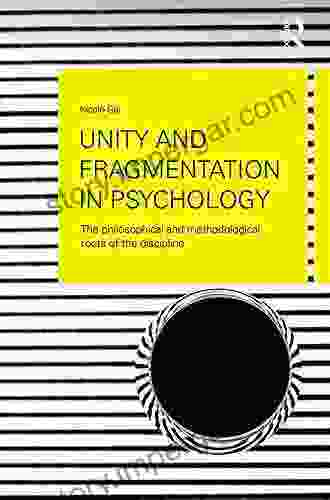Unity and Fragmentation in Psychology: Exploring the Intricate Tapestry of Connections and Divisions

The field of psychology, dedicated to unraveling the complexities of the human mind and behavior, is an ever-evolving landscape marked by both unity and fragmentation. This article aims to shed light on this intricate interplay, exploring the historical, theoretical, and practical dimensions of the concept.
4.9 out of 5
| Language | : | English |
| File size | : | 3194 KB |
| Screen Reader | : | Supported |
| Print length | : | 202 pages |
A Historical Lens on Unity and Fragmentation
The history of psychology reveals a dynamic interplay between unity and fragmentation. In the early days of the discipline, during the late 19th and early 20th centuries, a drive for unity prevailed, with prominent schools of thought such as structuralism and functionalism seeking to establish foundational principles and comprehensive frameworks for understanding the human psyche.
However, as psychology matured, specialization and diversification became increasingly evident. Different theoretical orientations emerged, each with its unique assumptions, methods, and areas of focus. This fragmentation led to the development of subfields such as cognitive psychology, social psychology, developmental psychology, and clinical psychology, each with its own distinct body of knowledge and practices.
Theoretical Perspectives on the Unity-Fragmentation Divide
The theoretical landscape of psychology further underscores the tension between unity and fragmentation. Various perspectives have emerged that attempt to bridge the gaps between subfields and disciplines, while others emphasize the inherent diversity and complexity of the human experience.
Some prominent unity-oriented perspectives include:
- Systemic theory: Views psychology as a complex system, where elements interact in dynamic ways to produce emergent properties.
- Cognitive neuroscience: Integrates psychology and neuroscience to understand the biological underpinnings of mental processes.
- Interdisciplinary approaches: Draw upon insights from multiple disciplines, such as sociology, anthropology, and philosophy, to gain a more comprehensive understanding of human behavior.
In contrast, fragmentation-oriented perspectives emphasize the inherent diversity and complexity of psychology. These perspectives argue that different theoretical frameworks and subfields are necessary to capture the full range of human experiences and behaviors.
Examples of fragmentation-oriented perspectives include:
- Constructivism: Emphasizes the subjective nature of knowledge and the role of individual experiences in shaping psychological understanding.
- Postmodernism: Rejects the idea of universal truths and emphasizes the influence of cultural and social contexts on psychological phenomena.
- Critical psychology: Challenges traditional psychological theories and practices, highlighting their potential biases and limitations.
Practical Applications of Unity and Fragmentation
The interplay of unity and fragmentation in psychology has significant implications for its practical applications. On one hand, a unified approach can provide a coherent framework for understanding and addressing psychological issues. For example, a systemic perspective can help clinicians consider the broader context and relationships that influence an individual's behavior.
On the other hand, fragmentation allows for specialization and tailored interventions. Different subfields of psychology have developed specialized knowledge and techniques to address specific psychological challenges. For instance, cognitive-behavioral therapy (CBT) is commonly used to treat anxiety and depression, while psychodynamic therapy focuses on uncovering unconscious conflicts.
Interdisciplinary Perspectives and the Future of Psychology
In the 21st century, interdisciplinary collaborations are increasingly recognized as a means to bridge the unity-fragmentation divide in psychology. By drawing upon insights from other disciplines, psychologists can gain a more holistic understanding of the human experience.
For example, collaborations between psychology and computer science have led to advances in artificial intelligence and machine learning, which are being used to develop personalized treatment plans and improve diagnostic accuracy. Similarly, collaborations with neuroscience have provided new insights into the neural underpinnings of mental processes.
As psychology continues to evolve, it is likely that the interplay of unity and fragmentation will remain a defining characteristic of the field. Embracing both a holistic and specialized approach will allow psychologists to gain a deeper understanding of the human mind and behavior, and develop more effective interventions to address a wide range of psychological challenges.
The concept of unity and fragmentation in psychology is a multifaceted and ongoing exploration. The historical, theoretical, and practical dimensions of this interplay have shaped the field and continue to influence its future directions. By embracing both unity and diversity, psychology can continue to advance our understanding of the human mind and behavior, and contribute to the well-being of individuals and society as a whole.
4.9 out of 5
| Language | : | English |
| File size | : | 3194 KB |
| Screen Reader | : | Supported |
| Print length | : | 202 pages |
Do you want to contribute by writing guest posts on this blog?
Please contact us and send us a resume of previous articles that you have written.
 Book
Book Novel
Novel Page
Page Chapter
Chapter Text
Text Story
Story Genre
Genre Reader
Reader Library
Library Paperback
Paperback E-book
E-book Magazine
Magazine Newspaper
Newspaper Paragraph
Paragraph Sentence
Sentence Bookmark
Bookmark Shelf
Shelf Glossary
Glossary Bibliography
Bibliography Foreword
Foreword Preface
Preface Synopsis
Synopsis Annotation
Annotation Footnote
Footnote Manuscript
Manuscript Scroll
Scroll Codex
Codex Tome
Tome Bestseller
Bestseller Classics
Classics Library card
Library card Narrative
Narrative Biography
Biography Autobiography
Autobiography Memoir
Memoir Reference
Reference Encyclopedia
Encyclopedia Michael Wolsten
Michael Wolsten Sean Hepburn Ferrer
Sean Hepburn Ferrer Maryanne M Mowen
Maryanne M Mowen Paul Mckay
Paul Mckay Max Green
Max Green Mark Schultz
Mark Schultz Marion Winik
Marion Winik Mario Fazekas
Mario Fazekas Matt Master
Matt Master Paul Smith
Paul Smith Mark Fitzpatrick
Mark Fitzpatrick Marty Raney
Marty Raney Mark Barratt
Mark Barratt Mary Plummer
Mary Plummer Matthew Trundle
Matthew Trundle Marcus Katz
Marcus Katz Marguerite De Lyon
Marguerite De Lyon Marco Gubbini
Marco Gubbini Norman Phillips
Norman Phillips S Razac
S Razac
Light bulbAdvertise smarter! Our strategic ad space ensures maximum exposure. Reserve your spot today!

 Michael ChabonTuning In To The Neo Avant Garde: A Journey into the Uncharted Territories of...
Michael ChabonTuning In To The Neo Avant Garde: A Journey into the Uncharted Territories of... Herbert CoxFollow ·17.9k
Herbert CoxFollow ·17.9k Nathaniel PowellFollow ·18.1k
Nathaniel PowellFollow ·18.1k Eddie PowellFollow ·16.6k
Eddie PowellFollow ·16.6k Henry JamesFollow ·16.8k
Henry JamesFollow ·16.8k Cristian CoxFollow ·6.1k
Cristian CoxFollow ·6.1k Henry GreenFollow ·8.1k
Henry GreenFollow ·8.1k Drew BellFollow ·14.7k
Drew BellFollow ·14.7k Isaac BellFollow ·13k
Isaac BellFollow ·13k

 Roberto Bolaño
Roberto BolañoUnveiling the Beauty and History of the Medici Iris: A...
In the realm of...

 Theodore Mitchell
Theodore MitchellImproving Gut Health in Poultry: Unlocking the Path to...
In the ever-evolving field of...

 Victor Hugo
Victor HugoPersonalized Medicine with a Nanochemistry Twist:...
The future of healthcare...

 George Martin
George MartinA Year Of Wine: Perfect Pairings Great Buys And What To...
## Year of Wine: An Epic Journey Through the...

 Tom Hayes
Tom HayesDelve into the Enigmatic World of Southern Africa's...
Embark on a captivating journey through the...
4.9 out of 5
| Language | : | English |
| File size | : | 3194 KB |
| Screen Reader | : | Supported |
| Print length | : | 202 pages |












